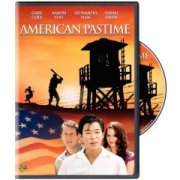


Baseball Toaster was unplugged on February 4, 2009.
Email me at btimmermann@gmail.com
Select a date:
 The internment of over 120,000 Japanese-Americans during World War II is not one of the prouder moments in the history of the United States. Writer/director Desmond Nakano was able to get a film made that a took a different look at this part of U.S. history, framing it around the subject of baseball as it was played in an internment camp in Utah in “American Pastime” (now available on DVD). The film succeeds to a certain extent, although a few clichés toward the end may make you realize that just about any film about baseball that comes out of Hollywood has an ending that may make a real baseball fan say, “That would never happen.”
The internment of over 120,000 Japanese-Americans during World War II is not one of the prouder moments in the history of the United States. Writer/director Desmond Nakano was able to get a film made that a took a different look at this part of U.S. history, framing it around the subject of baseball as it was played in an internment camp in Utah in “American Pastime” (now available on DVD). The film succeeds to a certain extent, although a few clichés toward the end may make you realize that just about any film about baseball that comes out of Hollywood has an ending that may make a real baseball fan say, “That would never happen.”
"American Pastime" does cover a worthy subject and it avoids being preachy, even though the topic of Japanese internment could easily be covered that way. Overall, it's a story about families more than a story about baseball or politics.
The DVD has a brief extra on the making of the film and a copy of the theatrical trailer. The film runs 105 minutes.
I guess documentaries don't make enough money. They're ivariably better with historical stuff.
Except for History of the World, Part I. That worked on any number of levels.
3 I need to get myself to a SABR convention. But that requires joining SABR. But you people are too smart for me. Intimidated by the SABR crowd....Yup, that's bad.
"Sleeping Tigers". It was about Japanese-Canadians.
http://tinyurl.com/2r4ye2
That actually made me cry at the end. It's hard to believe that in some things, Canadians could act worse than Americans in the area of race relations, but they did it during World War II.
Not only were Japanese Canadians moved out of B.C. and Alberta, they weren't allowed to move back when the war was over.
This and many other stories can be found in "The Golden Game: The Story of California Baseball" by Kevin Nelson
Comment status: comments have been closed. Baseball Toaster is now out of business.